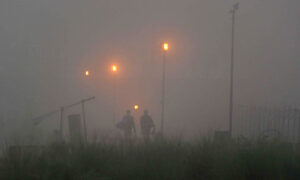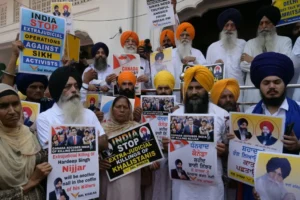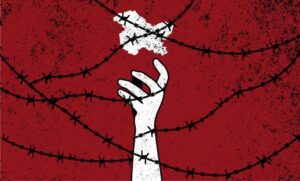
India’s unfounded allegations of human rights breaches in Pakistan and its alleged links to terrorism merit a befitting response. While India claims to be a “champion of human rights and democracy”, a closer look at its performance reveals how India deals with human rights abuses while maintaining a history of state-sponsored terrorism in Indian Illegally occupied Jammu & Kashmir (IIOJK).
The rise of “Saffron Terrorism” in India is a growing concern.
Indian State-Sponsored Transnational Terrorism
India has been accused of sponsoring extremist groups in neighboring countries such as Afghanistan, Sri Lanka, and Pakistan, to advance its expansionist goals and destabilize the region and beyond. Several extremist groups also exist within India, including those linked with Hindu nationalism such as the RSS, Vishva Hindu Parishad (VHP), Sangh Parivar, and the Bajrang Dal (BD), posing a considerable threat to religious minorities and social activists. The rise of “Saffron Terrorism” in India is a growing concern.
The BJP, with its ideology rooted in the RSS, has been ruling India since 2014 and is considered to be the “political face” of burgeoning terrorism enterprise. Additionally, India’s involvement in a “transnational killing” campaign, targeting political dissidents and voices critical of India’s treatment of minorities, has raised international alarm. The Intercept revealed leaked intelligence reports supporting these claims, and the Pakistani Ministry of Foreign Affairs presented a dossier further exposing India’s sinister missions abroad. The Indian Government should address its own problems before hurling baseless accusations against other countries.
India’s recent allegation that Pakistan is a “terrorism factory” is unfounded and misses the region’s complex reality. The charges that Pakistan is “sponsoring terrorism” and hosting “sanctioned terrorists” are frivolous and serve only as a “distraction strategy” from India’s own involvement in terrorism and harboring of terrorists.
Pakistan’s efforts in Combating Terrorism
In contrast to India, Pakistan has taken demonstrable actions to combat terrorism. These include removing militant infrastructure, apprehending important terrorists, and cooperating with international allies. Pakistan has consistently demonstrated its commitment to combating terrorism domestically and internationally, as evidenced by its successful military operations Zarb-e-Azb and Radd-ul-Fasaad. Furthermore, the Financial Action Task Force (FATF) removed Pakistan from the “grey list” in 2022, citing its success in combating terror financing and money laundering, despite India’s efforts to keep Pakistan on the list through disinformation campaigns. Pakistan has continuously condemned and vigorously battled all types of terrorism, including collaboration with the United States and Afghanistan in the aftermath of 9/11, despite the consequences continuing to haunt Pakistan to this day.

Indian Human Right Abuses in IIOJ&K
The attempt to divert serious concerns about Indian illegally occupied Jammu and Kashmir (IIOJK) by resorting to concealed allegations and historical revisionism is not only ineffective but also detrimental to the international community’s search for genuine solutions. India’s attempt to shift attention away from Indian human rights abuses in IIOJK by hurling baseless accusations is utterly dishonest.
Also Read: Kashmir Solidarity Day – Another Year of Indian Atrocities
The international community has regularly expressed concern about:
- Human Rights Watch, Amnesty International, and the UN Office of the High Commissioner for Human Rights (OHCHR) have documented cases of extrajudicial murders and torture by Indian security personnel in Jammu and Kashmir.
- Crackdowns on media, arbitrary detentions, and internet shutdowns significantly restrict Kashmiris’ fundamental rights.
- The abrogation of Articles 370 and 35A, which provided specific rights and protections for Kashmiris, has sparked fears about the loss of autonomy, violence, and increased marginalization.
India’s accusations against Pakistan ring hollow when compared with its own actions:
- Critics argue that the Citizenship Amendment Act (CAA) and National Register of Citizens (NRC) discriminate against Muslims and may result in millions losing their citizenship.
- The current situation in Kashmir, particularly the ongoing systemic genocide in IIOJK, with its history of brutality and restrictions on civilian rights, is the worst in recent history, raising severe human rights issues and calling into doubt India’s jingoistic “peace-loving nation” façade.
India’s attempt to divert world attention away from Indian human rights abuses in IIOJK by criticizing Pakistan is a well-worn strategy
India’s attempt to divert world attention away from Indian human rights abuses in IIOJK by criticizing Pakistan is a well-worn strategy. What India should do is analyze its own marginalization, violence, and neglect of Kashmir. Prime Minister Modi’s delayed visit to the region raises questions about the government’s commitment to addressing the aspirations of the Kashmiri people.
The extensive deployment of police, paramilitary forces, and security personnel suggests a heavy-handed approach to maintaining control rather than genuine peace and stability. This militarized presence serves to suppress dissent and reinforces the narrative of a peaceful Kashmir, conveniently ignoring the underlying tensions and grievances of the local population. Instead of hurling accusations at forums about Pakistan, Ms. Jagpreet Kaur should question her Sikh brothers and sisters, “Is India truly a country of pluralistic ethos and democratic credentials?”
The opinions shared in this article reflect the author’s personal views and do not necessarily align with the institution’s official stance.



